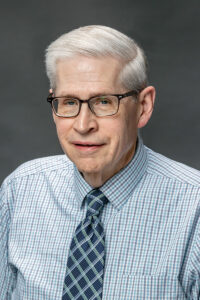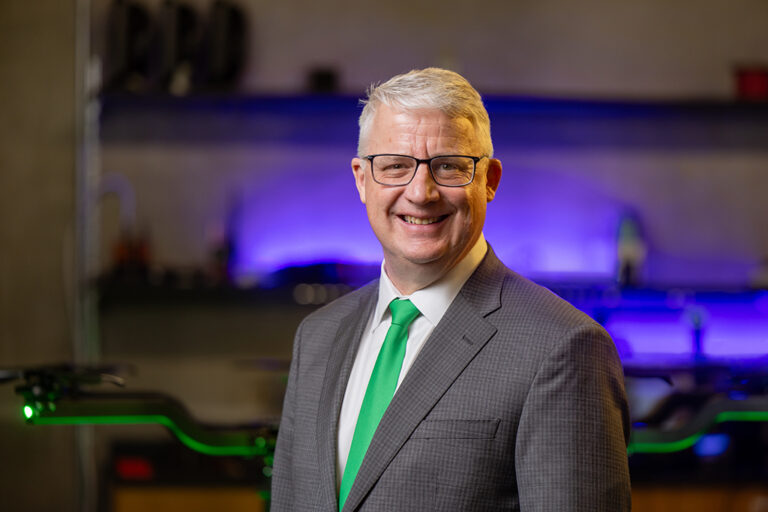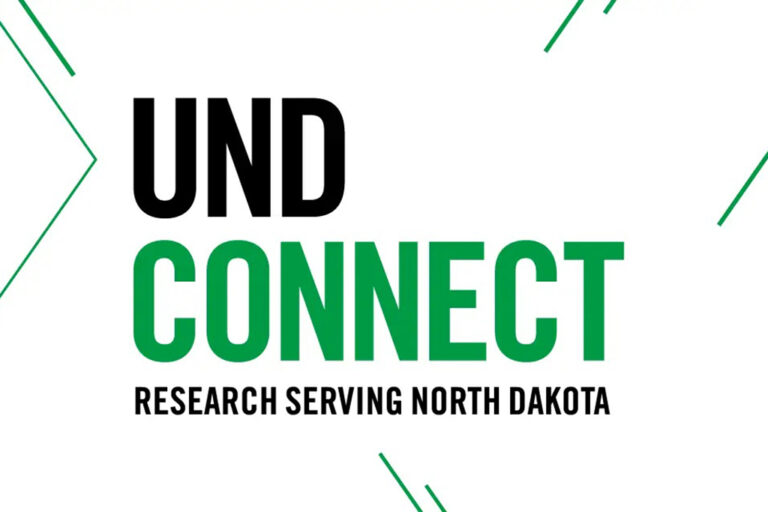40 years of fish and wildlife professional evolution
UND alum Steve Williams shares insights from long and distinguished career

Managing fisheries and wildlife resources isn’t only about following the science, it’s also about understanding public perceptions and managing public expectations, according to Steve Williams, president of the Wildlife Management Institute and a former director of the U.S. Fish and Wildlife Service.
Williams, who attended Pennsylvania State University and earned his master’s degree in biology from the University of North Dakota in 1979, came to campus last Friday to speak to students, faculty and alumni about his 40-year professional career in the fish and wildlife field. The event was sponsored by the UND Chapter of the Wildlife Society and the Department of Biology as part of the Glenn Allen Paur Lecture Series.
Williams outlined the changes he’s seen and experienced since the days when he and his wife lived in World War II-era tin huts on campus while pursuing their master’s degrees at UND.
“We didn’t have two dimes to rub together, but somehow we found camaraderie,” he recalled. “We were all kind of in the same boat. It was a wonderful, wonderful two years here.”
Early in his career as a wildlife biologist, the job revolved around protecting and preserving fish and wildlife for anglers and hunters.
“I would collect information, go to my director and say, ‘Here’s the decision we’re going to make because this is what the science tells us to do.’ That’s the way I originally started, and I’ve had quite an education since then.”
Williams described it as a command-and-control approach to managing wildlife resources.
“We would be in public meetings and say, ‘Here’s what we’re going to do for you; you’re welcome,’” he said. “We really focused on traditional wildlife. We were going to produce more wildlife. We told you that’s what we were going to do.”
Change is inevitable
Although numerous technological changes have occurred to vastly improve wildlife research and data collection, Williams believes the greatest change to how the profession will continue to evolve is recognizing the public’s role in shaping the policies driving the future of wildlife management.
“We used to think that people were always going to want to hunt and fish,” Williams explained. “Now that it’s declining, it’s made a lot of agencies take a look at where they’re headed in terms of funding for their future. We need to start talking about the relevancy of conservation to the American public – to everybody, not just hunters and anglers.”
This means seeing fish and wildlife not as resources to be managed, but as part of a public trust and assets to be preserved for the benefit of all Americans.
“Those assets are held in the trust, and they’re administered and managed by people who are fish and wildlife agency folks, biologists and federal agency people,” Williams said. “We manage those assets in this trust for the beneficiaries – for everybody in the country.
“But what’s difficult to understand when you’re just starting out in the profession is that we don’t get to make all those decisions,” he continued. “We’re not even the people that have the authority to make those decisions.

“It’s those folks that are on commissions or boards or legislatures that are the ones at the highest level policy decisions,” Williams noted. “They are the ones making the decisions. Our job is to inform them as best as we can. It’s difficult as you work through your profession how to understand and accept that role, but that is the role we play.”
Susan Felege, UND associate professor in wildlife ecology and management, agreed with Williams’ assessment of the profession, both in how it’s changed and how it needs to change.
“A lot of us get into fisheries and wildlife biology for the animals, for the fish,” she said. “When you really get into it, you realize people are at the heart of it. When you make any management decisions, you’re making management goals that are associated with people-driven values.
“Understanding how that interface comes together and provides value to society is really critical to saving and protecting wildlife and their habitats,” Felege added. “That evolution is right now at the forefront of everything from funding to how we see different legislation being supported.”
Workforce education
Classes at UND have evolved to meet the changing nature of the fisheries and wildlife profession. Cailey Isaacson, a senior fisheries and wildlife biology major from St. Michael, Minn., noted that Williams reinforced what she’s learned.
“Here at UND, we recently got the human dimensions class that is taught within the fisheries and wildlife program,” she said. “One thing we get told as students is even though you’re here to work with wildlife, a lot of it is about managing people. Managing people is the best way to manage wildlife.”

Williams said the university’s role is to make fisheries and wildlife administration and management more multidisciplinary because public perception plays a major role in decisions affecting the profession’s future.
“There are many other academic disciplines that we have to think about,” he explained. “It’s a human dimension for people who are actually experts in marketing and doing public surveys and social media and recruitment and retention.
“It’s about hiring people who may not be experts in waterfowl, biology or fisheries biology or fish hatcheries, but they know about people,” he added. “That’s what many agencies are starting to recognize, and they’re hiring people with those skills.”
Open communications
Felege echoed her support for the approach, noting that public opinion and perception are key to advancing fisheries and wildlife research.
“We, as scientists, aren’t really well trained in communicating this,” she said. “We’re good at talking to each other as scientists, but not necessarily to the public.
“Our communications matters a lot,” she continued. “Our public image, how we’re perceived interacting with wildlife in their habitats and how we’re perceived interacting with recreational activities is important.”
Steve Demmerly, a UND alumnus attending the lecture event, graduated in 2016 with a degree in fisheries and wildlife biology. He has seen firsthand the changes Williams described.
“It’s very much mirroring what I’ve been seeing in my few short years in the profession,” he said. “Having worked for the state park district, that’s almost the entirety of what people find for wildlife and viewing of it. People have their own needs and desires, and we really need to fit into their expectations for wildlife for themselves.”

Glenn Allen Paur was a Pisek, N.D., native who graduated cum laude with a B.S. in fisheries and wildlife management from UND, where he served as president of the Fisheries and Wildlife Biology Club, and was a member of the Wildlife Society. He drowned shortly after graduating in 1978 while assisting a UND professor with his research on Leech Lake, Minn.
Paur’s sisters, Nancy and Evie Paur, attended Williams’ lecture and presented the Glenn Allen Paur Memorial Scholarship to Brianna Ashworth, a junior fisheries and wildlife biology major from Dickinson. She was recently elected president of the UND Chapter of the Wildlife Society.



